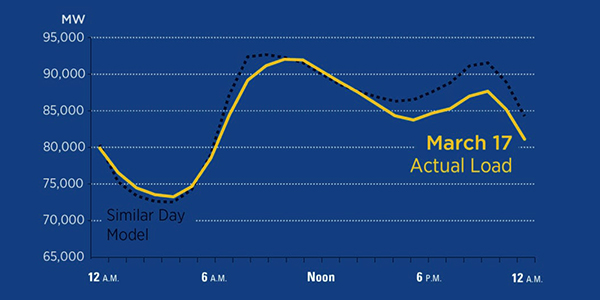UPDATED March 24: PJM announced it has canceled its annual meeting in Chicago on May 4-5 but will hold a Members Committee meeting via WebEx on May 4. The RTO also said it has extended the WebEx-only stakeholder meetings and its employee work-from-home policy until at least April 10.
By Rich Heidorn Jr. and Michael Yoder
PJM announced Monday it will hold a weekly call beginning Friday to update stakeholders on operational impacts from the COVID-19 pandemic. The calls, from 11 a.m. to noon, will continue until further notice.
The RTO said data from March 17 to 19 show the normal 8 a.m. morning peak has shifted to 9-10 a.m., and the evening peak is about 5% lower than expected. “The load curve also is flatter, without the same fluctuations usually shown by morning and evening peaks and valleys, when people are preparing for work in the morning or dinner at night,” PJM said. “The impact so far has been noticeable, but not severe,” said Michael Bryson, senior vice president of operations. “This is similar to patterns we typically see on a snow day.”
PJM said telecommuters may be getting up later without having to commute. While commercial use of electricity is down with schools and businesses closed or operating remotely, the reductions will be partially offset by an increase in residential use.
On Monday, March 16, when PJM would normally have expected about 100,000 MW of load, it lowered its forecast to 94,500 MW. Load came in at about 95,500 MW.
PJM has implemented a work-from-home policy through April 10 for employees, with the exception of system operators and other shift personnel. Employees are also working longer shifts to minimize shift changes. The RTO said it successfully tested its work-from-home capabilities on March 13. PJM markets, planning, stakeholder meetings and member relations can all be operated remotely, it said.
On Friday, PJM opened a survey of its generation operators to identify operational risks resulting from the COVID-19 pandemic. PJM said the survey, in the eDART application, will remain open indefinitely to allow updated responses as conditions change.
The survey includes both company- and unit-level questions to identify potential delays or restrictions on fuel and consumable item deliveries and contractor and staff health concerns that may impact scheduled outages.
Example questions:
- Are you currently experiencing any workforce impacts (either plant personnel or contractors) that could impact the unit’s availability or reliability in any way?
- Regarding outages that are currently active, do you foresee any chance of needing to extend the duration of the outage to complete the work to return the unit to service?
- Regarding outages currently scheduled over the next 12 weeks but not yet started, do you foresee the need to cancel or postpone these due to contractor or resource limitations?
- Are you aware of any staffing limitations on any of your fuel suppliers, including gas pipeline operators?
- Do you anticipate any changes to any of your unit’s operational parameters (e.g., emergency minimums, minimum down time etc.)?
- Is there anything PJM can do to help support any specific needs of this unit during this period?
The survey asks for ideas on best practices. “Examples could include: Segregating MOC dispatchers to multiple locations; limiting interactions between shift personnel (MOC or Plant) as much as possible; implementation of enhanced cleaning processes; evaluation of upcoming outages to determine the feasibility of deferral.”
Questions on the survey can be sent to edartgosurvey@pjm.com.





